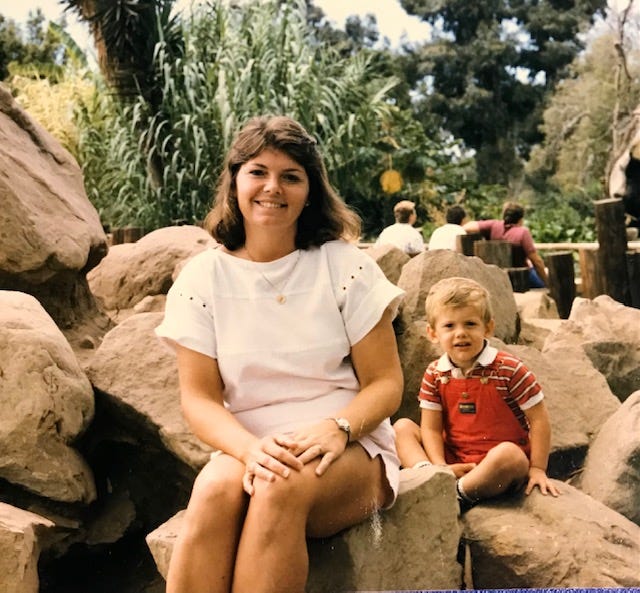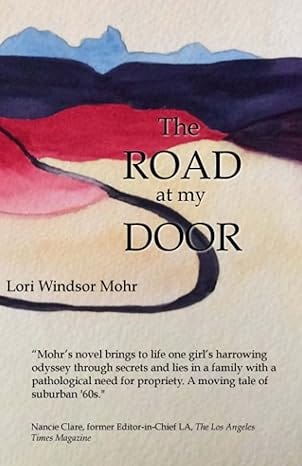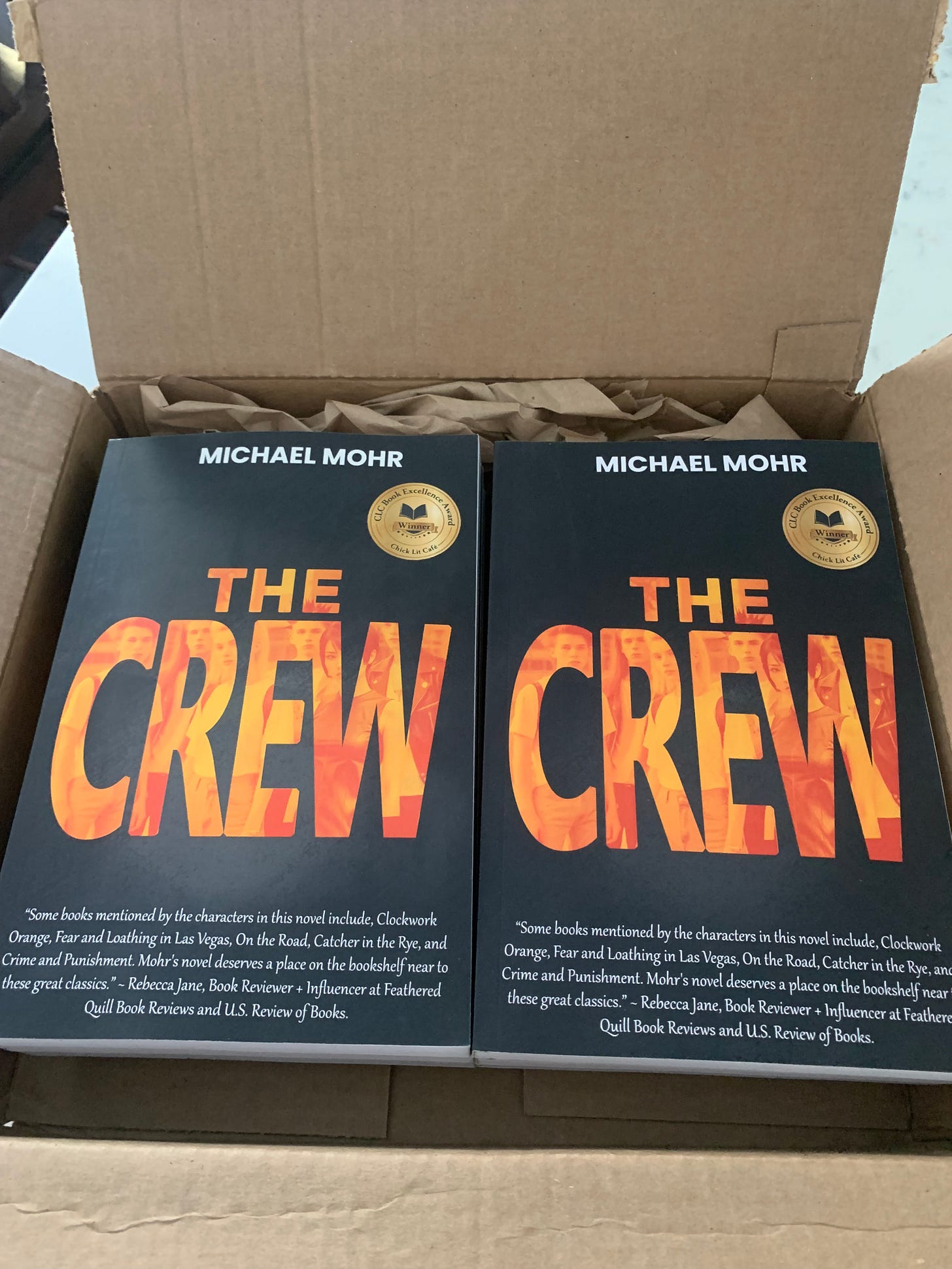Writing and Literature: A Mother and Son Tradition
My Mother and Me: Our Books Tell Our Stories
Buy my mom’s novel, The Road at My Door
#
Buy Michael Mohr’s book, The Crew
~
Growing up my mom read the classics to me at night: Fitzgerald; Faulkner; Hemingway; O’Connor; etc. She was a nurse and then a college nursing instructor but she always loved writing and books. Mom had a large, dusty library and I pulled books down frequently. I remember distinctly trying to comprehend Boris Pasternak’s Doctor Zhivago around age eight or nine. It flummoxed me but I was captivated by the sentences, the cognitive images, the sensory magic, the way the author narrated the story.
Had my mom not become pregnant with my sister at age 19—in 1969—she might have chased her dream of becoming an author back then. But parenting and a young, rocky marriage changed everything. Eventually, though, as all serious writers do, she returned to her obsession with prose. She wrote and published her first book—an autobiographical novel called The Road at My Door—in 2015.
I was born on the final day—New Year’s Eve—of 1982. (Incidentally, as I would find out decades later, one of the last good “pure” years of American punk rock.) I discovered punk music in Ojai—90 miles northeast of Los Angeles where I grew up—around 1993, when I was about 10. The obsession grew from there.
But, like my mother, my obsession was not limited to music. (There’d been a time when my mother briefly hung out with bands like The Rolling Stones. She has the photos to prove it.) I was also obsessed with writing. There was something about expressing myself by propelling prose on the page that pushed me out of possibly painful places which felt like paradise but were actually prison. (You like that alliteration?) In short: I could somehow feel fully alive by putting pen to paper.
As a kid, when Mom and I got into screaming fights, we’d break apart, and then slide pages-long handwritten letters to each other under our doors. It was our safest method of communication. In some ways her book and my debut novel—The Crew—are like book-length letters to each other.
I’ve written about my story often on this Substack. My own torrid trail of tears; The Drinking Years from age 17 to 27; the punk rock anarchy; the alcoholism; the violence; the sex, drugs and rock-n-roll. It all started in high school—ironically at the Catholic, college-prep institution my folks assumed I’d be safe at—in the year 2000, and “ended” in 2010, when I was 27, the year I hit an emotional and spiritual bottom and got sober. Now I’m 41 and it’s been 13.7 years since I had my last drink.
And yet, in many ways I still possess that “punk spirit.” I’m still that intense young punker, flipping society The Bird. Only I don’t do it through punk rock, danger, violence, alcohol and self-destruction. I do it through writing, through thinking independently, through being wholly myself and no one else. I do it through creative expression; dare I call it Art. I do it by being both a part of a community and yet also entirely my own man. I’ve never been a follower. I’ve always done my own thing. Punk culture was fun in the beginning—when I was 16, 17—but I found out quickly that it, too, was just another costume, another trend, another capitalistic tool, another blob of conformity. All groups suffer this fate.
I stood alone. My mother, in her way, stood alone. She was not a punk rocker, nor even a 1960s rock-n-roller. Instead she was a survivor, pure and simple. She taught me what it meant to be a writer, to be a thinker, to appreciate literature for its own sake. To the extent that my mom has always been “bourgeois” in my eyes—hyper conventional—she has also, at the same time, always been true to herself, her own nature, her own desires, her own dreams.
Her book tells the story of her survival. My book tells the story of mine. Together, you are presented with Our Story. The tale of a mother and son, two smart, sensitive, thoughtful, and wounded human beings trying desperately to cling to whatever makes sense around them. We both made it.
These are tales of family trauma, spiritual wounding, assertive decision-making, calculated escape, love, loss and rebellion. It just goes to show: Coming from money is no guarantee of safety in life. We all have our demons, both external and internal. The way to battle those demons, for my mother and I, has been through writing.
These are our stories.
~
Book description (from Amazon):
The Road at My Door follows protagonist Reese Cavanaugh on a dark journey to save her family without destroying herself. Set against the backdrop of the Cold War and the sexual revolution, Mohr examines cultural forces shaping family life in a decade of upheaval. Road is a perfect storm of conflicting needs and beliefs about love of self, love of another, fast-changing attitudes about sex, and the toxicity of family secrets. Through Reese Cavanaugh, Lori Mohr delves into the deep tension between appearance and reality, portraying a family in turmoil.
*
Lori Mohr bio:
Lori Windsor Mohr, a native Californian, grew up in Pacific Palisades during the 1960s. After earning a master's from UCLA, she worked in mental health and taught nursing while continuing to write. Dozens of her short stories have been published in journals and online. In The Road at my Door, Mohr draws on her own experience with depression as one way of fighting the stigma still associated with depressive illness.
##
Description (from Amazon)
When Jack Donnigan—a naïve, protected 16-year-old sophomore at St. Andy’s Prep in Southern California in 2000—jumps into The Crew, a renegade punk rock clique on campus led by the nefarious and intelligent Cannonball, he is thrilled. But he soon challenges Cannon’s leadership by starting a secret relationship with Cannon’s chosen girl, Sarah, and by jumping on stage at live punk shows, displaying more bravery to the rest of the members.
Jack’s relationship with mom and dad becomes increasingly strained. He stays out late and rebels for the first time, enjoying his freedom and wild experimentation. The faculty at St. Andy’s—wanting to dismantle the cult hero status of The Crew on campus—organize a coup. They plan to nail the perceived leader: Jack Donnigan, who’s been conned by Cannonball.
Meanwhile, Sarah and Jack decide to run away to Jack’s uncle’s in San Francisco, flee their small town and live “real life.” Jack’s mentor is his beloved but unconventional English teacher, Mr. Bryce. When the faculty nail Jack, Mr. Bryce does his best to save the floundering student. But when Jack is finally kicked out of his folks’ home, and Cannonball connives to drum up drama, stealing Sarah back by spreading a web of lies, who will save him from himself?
*
Michael Mohr bio:
Michael Mohr is a Pushcart Prize-nominated writer, former literary agent’s assistant and freelance book editor. Mohr's fiction has been published in the following: Concho River Review; Adelaide Literary Magazine; Fiction Magazines; Tincture; Flash: The International Short Short Story Magazine; Aaduna; MacGuffin; Alfie Dog Press; Milvia Street; and more. His blog pieces have been included in Writers’ Digest, Creative Penn, Writer Unboxed and MASH. Mohr writes regularly on Substack ('Sincere American Writing'). Michael has professionally edited books by authors such as former-neo-nazi-turned-anti-hate-activist Christian Picciolini ("White American Youth"; "Breaking Hate"), Deborah Holt Larkin ("A Lovely Girl: The Tragedy of Olga Duncan and the Trial of One of California's Most Notorious Killers"), Gini Grossenbacher ("Madam in Silk") and many others.






